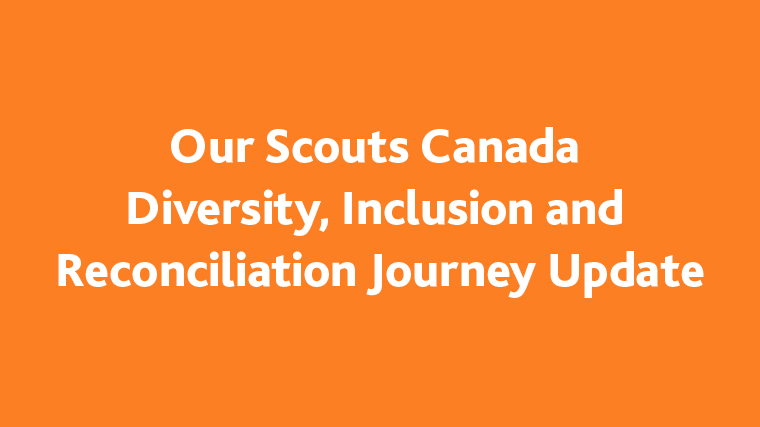This is our Moment
As a movement and community, Scouting empowers youth with core values and skills that nurture their personal development, equipping them with the ability to benefit their communities and the planet.
While we strive to demonstrate our core values in a welcoming and inclusive way, Scouts Canada recognizes we have not delivered on this promise to all people. We have not consistently been the best ally we can be in both implicit and explicit ways, but we believe we can learn and do better.
It is our time to demonstrate and live our core values in this changing world. Through reflecting on our past, examining any systemic issues, and listening to feedback from our members and subject matter experts on our strengths and areas for growth, we can create an informed path forward and embrace our full potential together. This is an exciting moment to create a fresh approach towards welcoming all youth who want to belong.
Why now?
Scouts Canada’s Board of Governors dedicated a pillar in our Strategic Plan to be inclusive and pursue Indigenous Reconciliation. The intent is to make all feel welcome and included in Scouting by addressing any ways we may alienate diverse needs and perspectives, and the root causes. We want to offer programming that fosters genuine friendships and respect between diverse Canadians.
Our path towards this has begun by first listening to you, our members, on what your current perspectives, needs, and suggestions are for this journey. We have also onboarded our Internal and External Reconciliation Advisors, who have graciously offered to strategically guide us at quarterly advising sessions. We will continue to listen and learn through conducting a systemic audit of the organization, and tailor an action plan based on our specific strengths, gaps, and opportunities for improvement.
Where are we?
We have taken the following actions as part of Phase 1 of Scouts Canada’s Reconciliation Journey:
Listening to our FNMI members: we began our journey by first inviting our First Nations, Métis, and Inuit (FNMI) members to share concerns and suggestions on Scouting practices.
Co-creating a way forward with an Indigenous Reconciliation Steering Committee: made up of six Indigenous individuals—Scouts Canada members and non-members— to guide us on the strategic way forward in our inclusion journey. This is our first approach to co-creation and seeking guidance from those with expertise and lived experience. We are grateful to welcome:
- Torri Weapenicappo (Ontario)
- Sonja Perley (New Brunswick)
- Naomi Withers (Alberta)
- Lisa Sheppard (British Columbia)
- Jonathan Dueck (New Brunswick)
- Jonathon Michel (Northwest Territories)
Our Advisors bring to us a wealth of talent, excellence, and lived experience from their respective perspectives. We have a dynamic set of perspectives, including urban, Métis, rural, emphasis on the insights and work generated from (Murdered, Missing Indigenous Women) MMIW efforts, regions, on-reserve, off-reserve, creative, and corporate. We also acknowledge that this group does not necessarily capture the full spectrum of diversity across First Nations, Métis, and Inuit perspectives. We are grateful that they have offered to start with us at the beginning so we can build a more inclusive future.
Partnering with a third-party, to support our journey and lead the Systemic Inclusion Audit of Scouts Canada to gather data on where we are now and where we want to be.
Listening to our membership: Drawing upon key principles and design of the Scouting Dialogue For Peace initiative, we held a first round of seven Listening Sessions with 133 participants to gather positive and critical feedback on our approach to Inclusion and Reconciliation.
What We Heard
- We are not fully ready or mature enough to implement certain actions. For example, land acknowledgements may have positive intentions, but they are not always done in a way that is authentic and with awareness of their purpose.
- Some of Scouts Canada’s standard practices are serious barriers to inclusion for multiple groups of people. For example, Scout Groups commonly meet in church or other religious spaces, which can unintentionally be a deterrent.
- We still have aspects of our history working against us despite changes, like still being seen as boys-only. What other ways might our history impact how we are seen?
- Awareness of Indigenous knowledge and perspectives must go beyond tokenistic activities like beading, crafts and dream catchers. Activities need to seek a deeper understanding and further clarification around what cultural appropriation—versus appreciation—is.
- A desire to better understand Scouts Canada’s history in relation to residential schools, plus identify how our history informs our practices today and make appropriate changes moving forward.
- We can’t change what we don’t acknowledge— we need to take ownership and make a statement about moving forward. It’s time to re-assess our Scouting symbols, honoured public figures and imagery.
- Desire to see diverse leadership in Scouts Canada to move us forward.
Next Steps
Individuals who are interested in contributing to the audit process, being an ambassador of this work, or who have subject matter expertise on matters of Inclusion are encouraged to sign up here.
We will continue to update our community along the way and anticipate sharing further reflections of the process in Spring 2022. Regarding our specific approach to Reconciliation, see each Phase of our Reconciliation Journey.
We are excited to continue to share our progress and encourage you to keep updated on the different phases of our Reconciliation Journey.

